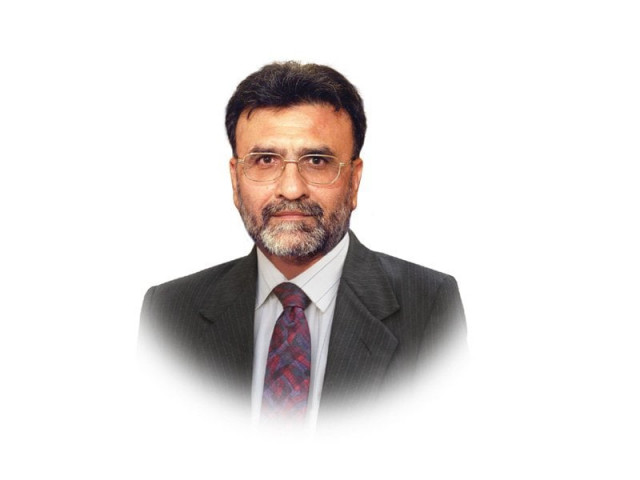The Achakzai analysis
In spite of many engaging speeches, Mehmood Khan Achakzai stole the show in the end.

Nusrat Javeed
It certainly was a day of heavyweights at the national assembly. After laborious combing of budget-related statistics, experienced politicians like Shah Mehmood Qureshi and Aftab Ahmad Sherpao spread the feeling that, like his predecessors, Ishaq Dar might also fail to achieve targets set in budget documents. Most people had expected that while presenting its first budget, the third Nawaz government would be focusing on kick-starting a stagnant economy. Elected politicians would set the agenda for bureaucrats to follow. But Dar seemingly failed to live up to these expectations.
In spite of many engaging speeches, Mehmood Khan Achakzai stole the show in the end. Without raising his voice or garnishing his speech with grim and heavy words, the Pashtun nationalist from Balochistan was radically blunt in saying what he thought should now appear obvious to the “incurably delusional elements of our establishment.” In the everyday language of an average Joe, Achakzai kept pleading that it was time to realize that Pakistan could not “dictate its terms to all its neighbors and the rest of world, simply because Qadeer Khan has made an (atomic) bomb for an army of 500,000 personnel.”
Starting from the disastrous consequences of Japan’s adventurous attack on Pearl Harbor, he moved on to recall the miseries Saddam Hussein and Muammar Qaddafi had brought to their countries. “The world will never allow us to use our atomic bomb. For God sake, forget the dreams of blackmailing the world with this nuclear capability,” he continued.
Since the Soviet invasion of Afghanistan in December 1979, he believed, the military oligarchs of Pakistan have developed the habit of dictating their agenda, not only to the hapless people of this country but to neighboring countries as well. From all across the world we collected thousands of bigots and trained them to destroy schools, bridges and infrastructure in “enemy territories.” The Soviet Union withered away in Afghanistan and the US abandoned it. Yet, “we continued to look for strategic depth in Afghanistan” and in the process pampered and facilitated elements who eventually provoked the US-led war on terror by staging 9/11.
Being a diehard Pashtoon nationalist, Mehmood Khan did sound very convincing by vehemently insisting that after the US invasion of Afghanistan, “we (the Pakistan establishment) forced people living in our tribal areas to act as hosts of Muslim warriors running for their lives from Afghanistan.” In the end, the international community forced Pakistan to send its troops to these areas to sort out the same guests, thus provoking most residents of FATA to declare a war on Pakistan and its armed forces. The war waged in the name of Islam has now reached every nook and corner of Pakistan.
A good number of legislators were present on the PTI benches when Achakzai was spinning a hair-raising tale to name and shame. Not one dared to stand and challenge him when he further strengthened his argument by claiming that, motivated by a sheer need for revenge, some residents of Pakistan’s tribal areas “volunteer to point out houses where hardened elements wanted by the US live as guests. These same houses later become drone targets.”
Achakzai was not just giving a monologue. He did offer a doable-looking strategy to get out the bloody mess Pakistan seems to have created for itself. The key point of his recommendations remained focused on the point that elected representatives must take full command and control of areas considered “strategic” thus “off limits to bloody civilians.” Before ending, he made a firm commitment that if this assembly failed to assert its sovereignty in another year or so, he would resign and go home with the clear intent of never trying to return to an elected house.
Notwithstanding my heartfelt praise for Mehmood Khan’s telling it all with in-your-face bluntness, I feel forced to express the fear that perhaps he would not need to wait for long to move on his pledge of quitting an elected house. During the last weekend, we had witnessed not one but two startling incidents of terrorism in Balochistan. The dispassionate observers strongly suspect that these events were staged to ruin the feel-good mood that Nawaz had created by facilitating the placing of Dr Malik as the chief minister of a chaos-hit province. The state of Pakistan must employ all its resources to locate the perpetrators of these events and for that purpose both the civilian and the military institutions need to be on the same page.
During their fact-finding visit to Balochistan after the recent events, however, Nawaz Sharif’s aides heard stories that insidiously blame Deep Penetrating Agents (DPAs) of some hawkish elements from within the establishment for “staging” high profile incidents. The Residency in Ziarat where the founder of Pakistan had spent his last days, most political workers in Balochistan strongly suspect, was destroyed by remote bombs to provoke a massive and ruthless chase of Baloch separatists. By walking into the alleged trap, Islamabad would certainly ruin the feel-good mood that Dr Malik’s selection as the Chief Minister of Balochistan had stirred.
Published in The Express Tribune, June 18th, 2013.



















COMMENTS
Comments are moderated and generally will be posted if they are on-topic and not abusive.
For more information, please see our Comments FAQ